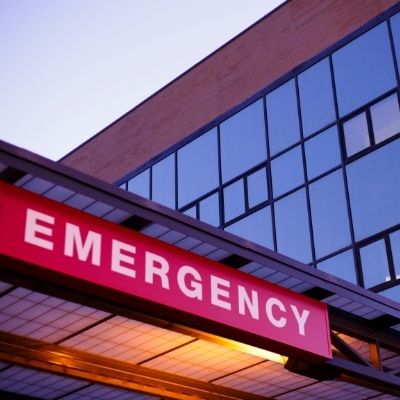No one enjoys the idea of going to the emergency room. However, there are times when it’s the best decision you can make. While you may not consider certain symptoms an emergency, they could point to a more severe underlying issue that requires immediate treatment. To help you be certain when it’s time, we’ve listed the seven signs that you need to go to the emergency room.
Don’t put off going to the emergency room if you’re experiencing:
- Severe headaches or dizziness
- Pain in the chest or upper abdomen
- Lower abdominal pain
- Shortness of breath
- Uncontrolled bleeding
- Severe or persistent vomiting or diarrhea
- Severe allergic reactions
You should always choose your primary care physician over the emergency room if circumstances allow for it. This is because they know important factors such as your medical history and the medications you’re taking, giving them a much better understanding of your overall medical history.

1. Severe Headache or Dizziness
A severe headache can point to a few different issues, including an inner ear problem, motion sickness, or an unexpected reaction to medication. It could also mean that you’re having a stroke, which is when the blood to your brain has either been interrupted or cut off completely.
Stroke-related headaches are much worse than your standard headache. They’re often accompanied by dizziness, vomiting, and impaired consciousness along with severe pain.
Other symptoms include:
- Trouble talking or understanding speech
- Numbness in your face, arm, or leg
- Difficulty seeing out of one or both eyes
- Trouble walking
Seek treatment immediately if you are showing symptoms of a stroke since it can cause brain damage along with other problems. Your local emergency room will be able to provide quick treatment to preserve your health.
Click here to learn more about the warning signs of a stroke!
2. Pain in the Chest or Upper Abdomen
Chest pain can have different causes, but a heart attack is one of the most dangerous. Also known as a myocardial infarction, heart attacks occur when the heart doesn’t get enough blood. The lack of blood damages the heart muscle over time, which eventually leads to a heart attack.
Pain or discomfort in the chest is one of the most common symptoms of a heart attack. Located in the center or left side of the chest, it can last for a few minutes or it can go away and come back. It’s often described as a squeezing, fullness, or uncomfortable pressure. This is often accompanied by difficulty breathing, which can occur before chest pain.
3. Lower Abdominal Pain
Sudden pain in your abdomen can signal a problem with one of your internal organs located in the middle of your body. This could be a sign of acute appendicitis, which is when the inside of the appendix gets blocked. Blockages can happen for a variety of reasons, including an infection in the digestive tract or stool stuck between the appendix and the large intestine.
A ruptured appendix can cause very dangerous complications. As the walls of the organ become weaker, mucus and stool can escape into the abdominal cavity and cause peritonitis. This can inflame the inner lining of the abdominal wall and lead to blood infection, organ failure, or even death without treatment.
To learn more about appendicitis, click here!
4. Shortness of Breath
Most cases of shortness of breath can be traced back to problems with the heart or lungs. This is because they play such important roles in transporting oxygen throughout your body. These vital organs are also important for removing carbon dioxide. Issues with either organ can have a major impact on your ability to breathe, resulting in shortness of breath.
Sudden shortness of breath can have a number of causes, including:
- Asthma
- Carbon monoxide poisoning
- Pulmonary embolism
- COPD (Chronic Obstructive Pulmonary Disease)
Go to the emergency room immediately if you have sudden shortness of breath. It’s usually a sign of a more serious condition that requires immediate treatment. Your local emergency room will be able to treat the symptoms and diagnose the problem so that you receive the treatment you need.
5. Uncontrolled Bleeding
It’s one thing to nick yourself shaving every once in a while, but uncontrolled bleeding is another matter entirely. For instance, a nosebleed that lasts over an hour would warrant a trip to the emergency room. You should also go to the emergency room if you find blood where you usually wouldn’t, such as in stool or vomit.
Those on blood thinners should be especially wary if they start bleeding. This is because blood thinners interfere with blood’s natural ability to clot on its own, causing wounds that would normally be healed with a bandage to become a much more serious situation. If you’re on blood thinners, talk to your doctor about bleeding and other complications that can arise.
6. Severe or Persistent Vomiting or Diarrhea
Going to the emergency room for vomiting becomes necessary when you can’t keep anything down for an extended period of time. This is especially important for the young, elderly, and those with underlying health conditions since it can lead to dehydration. Causes can vary, so it’s important to talk to a doctor to learn the cause and how to put a stop to it.
Cases of diarrhea that last longer than a day may point to a more serious problem. As with vomiting, this is important to monitor due to the risk of dehydration. Go to the emergency room immediately if you also experience dizziness or light-headedness since these are key signs of dehydration.
7. Severe Allergic Reactions
You likely won’t require a trip to the emergency room if you have the sniffles. On the other hand, an allergic reaction to food requires immediate medical treatment. You may be able to treat the problem at home, but you should never risk it if you’re not 100% sure. You should also seek treatment if you experience new symptoms that you’ve never had before.
Signs to call 911 for a food allergy include:
- Hives
- Swollen lips or tongue
- Difficulty breathing
- Abdominal problems
- An asthma attack
It’s important to know what’s in your food if you have food allergies. Check labels before you buy and always err on the side of caution if you’re eating something that someone else made.
Do you have an underlying medical issue that could result in a trip to the emergency room? Call us today at (812) 424-8231 or (800) 264-8231 to schedule your appointment!
Talk to your primary care physician instead of going to the emergency room if time allows. They know your medical history and which prescriptions you’re taking, giving them a much better understanding of your overall medical history.
Don’t put off seeking treatment for a sudden or persistent medical problem since it can point to a more serious issue. What may seem like a severe headache or bout of dizziness may actually be a stroke. Chest pain can indicate a number of issues including a heart attack. Lower abdominal pain can point to a problem with organs in your midsection. Shortness of breath is often the result of heart or lung issues.
Bleeding that lasts longer than an hour or those on blood thinners should seek treatment immediately. Severe and persistent vomiting or diarrhea can lead to dehydration which is especially dangerous for children, the elderly, and those with underlying health issues. Allergic reactions, particularly to food, should be treated immediately and not left to chance.
Evansville Surgical Associates has been providing comprehensive and compassionate surgical care for over 50 years. Call us at (812) 424-8231 or (800) 264-8231. We are available from 8:00 am to 4:30 pm if you would like to schedule an appointment.



